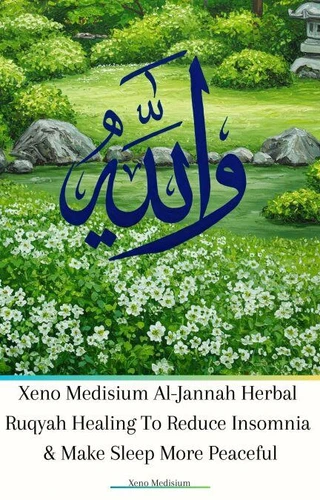Xeno Medisium Al - Jannah Herbal Ruqyah Healing To Reduce Insomnia & Make Sleep More Peaceful
Par :Formats :
Disponible dans votre compte client Decitre ou Furet du Nord dès validation de votre commande. Le format ePub est :
- Compatible avec une lecture sur My Vivlio (smartphone, tablette, ordinateur)
- Compatible avec une lecture sur liseuses Vivlio
- Pour les liseuses autres que Vivlio, vous devez utiliser le logiciel Adobe Digital Edition. Non compatible avec la lecture sur les liseuses Kindle, Remarkable et Sony
 , qui est-ce ?
, qui est-ce ?Notre partenaire de plateforme de lecture numérique où vous retrouverez l'ensemble de vos ebooks gratuitement
Pour en savoir plus sur nos ebooks, consultez notre aide en ligne ici
- FormatePub
- ISBN8231891191
- EAN9798231891191
- Date de parution06/05/2025
- Protection num.pas de protection
- Infos supplémentairesepub
- ÉditeurWalzone Press
Résumé
Insomnia is a common sleep disorder that makes it difficult to fall asleep, stay asleep, or get restful sleep, even when you have the chance to do so. People with insomnia often feel tired during the day, have low energy, difficulty concentrating, mood disturbances, and decreased performance at work or school. It can be short-term (acute), lasting for a few days or weeks, often triggered by stress or life changes.
Long-term (chronic) insomnia lasts for a month or longer and may be linked to underlying issues such as anxiety, depression, chronic pain, or poor sleep habits. Several factors can contribute to insomnia, including irregular sleep schedules, excessive screen time before bed, caffeine or alcohol use, and underlying medical or mental health conditions. Treatment depends on the cause and severity. In Islamic medicine, insomnia?-?known as sahar or suhar in Arabic?-?is recognized as a disturbance in the natural rhythm of sleep, which is considered essential for both physical and spiritual well-being.
Islamic scholars and physicians, particularly during the Golden Age of Islam, discussed the causes, effects, and treatments of insomnia in detail. They approached it holistically, combining physical, psychological, and spiritual perspectives.
Long-term (chronic) insomnia lasts for a month or longer and may be linked to underlying issues such as anxiety, depression, chronic pain, or poor sleep habits. Several factors can contribute to insomnia, including irregular sleep schedules, excessive screen time before bed, caffeine or alcohol use, and underlying medical or mental health conditions. Treatment depends on the cause and severity. In Islamic medicine, insomnia?-?known as sahar or suhar in Arabic?-?is recognized as a disturbance in the natural rhythm of sleep, which is considered essential for both physical and spiritual well-being.
Islamic scholars and physicians, particularly during the Golden Age of Islam, discussed the causes, effects, and treatments of insomnia in detail. They approached it holistically, combining physical, psychological, and spiritual perspectives.
Insomnia is a common sleep disorder that makes it difficult to fall asleep, stay asleep, or get restful sleep, even when you have the chance to do so. People with insomnia often feel tired during the day, have low energy, difficulty concentrating, mood disturbances, and decreased performance at work or school. It can be short-term (acute), lasting for a few days or weeks, often triggered by stress or life changes.
Long-term (chronic) insomnia lasts for a month or longer and may be linked to underlying issues such as anxiety, depression, chronic pain, or poor sleep habits. Several factors can contribute to insomnia, including irregular sleep schedules, excessive screen time before bed, caffeine or alcohol use, and underlying medical or mental health conditions. Treatment depends on the cause and severity. In Islamic medicine, insomnia?-?known as sahar or suhar in Arabic?-?is recognized as a disturbance in the natural rhythm of sleep, which is considered essential for both physical and spiritual well-being.
Islamic scholars and physicians, particularly during the Golden Age of Islam, discussed the causes, effects, and treatments of insomnia in detail. They approached it holistically, combining physical, psychological, and spiritual perspectives.
Long-term (chronic) insomnia lasts for a month or longer and may be linked to underlying issues such as anxiety, depression, chronic pain, or poor sleep habits. Several factors can contribute to insomnia, including irregular sleep schedules, excessive screen time before bed, caffeine or alcohol use, and underlying medical or mental health conditions. Treatment depends on the cause and severity. In Islamic medicine, insomnia?-?known as sahar or suhar in Arabic?-?is recognized as a disturbance in the natural rhythm of sleep, which is considered essential for both physical and spiritual well-being.
Islamic scholars and physicians, particularly during the Golden Age of Islam, discussed the causes, effects, and treatments of insomnia in detail. They approached it holistically, combining physical, psychological, and spiritual perspectives.





